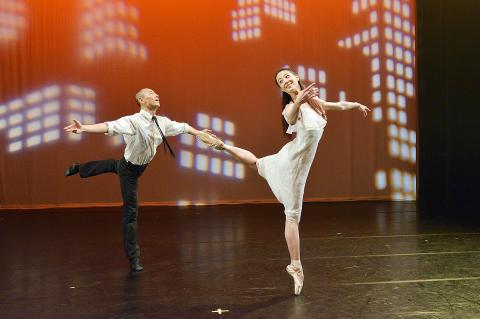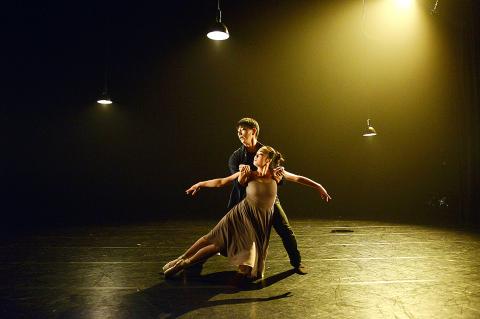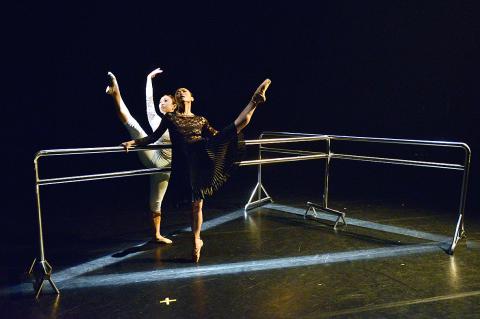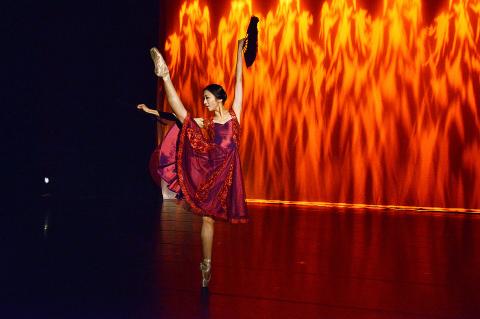Scheduling problems have kept the Kaohsiung City Ballet (KCB, 高雄城市芭蕾舞團) from making its almost annual pilgrimage north to Taipei with its Dance Shoe (點子鞋) production, which is a loss for Taipei ballet fans, given the caliber of last year’s show.
Company founder Chang Hsiu-ru (張秀如) could not get her troupe into the Experimental Theater before the venue closed for its annual Lunar New Year renovation and clean-up period, and so had to settle for two-city tour.
KCB premiered this year’s Dance Shoe in Greater Tainan two weekends ago and this weekend it returns to its “home theater,” Chihteh Hall at the Kaohsiung Cultural Center, for two shows.

Photo Courtesy of Liu Ren-haur
This 12th version of Dance Shoe features works by four Taiwanese choreographers and one foreign freelancer, all of whom will be familiar names for the company’s fans.
The local choreographers, in keeping with Chang’s desire to showcase southern talent, are either all from southern Taiwan or now work there.
Tsai Po-chen (蔡博丞), who has had pieces in several earlier shows, created the stellar Little Star (小小星辰) last year, while Wang Wei-ming (王維銘), a former Cloud Gate dancer who now teaches at Shu-Te University in Greater Kaohsiung, had a piece in last year and in 2013. Lai Hung-chung (賴翃中) and Dai Ting-ru (戴鼎如), a dancer with the company who is now working on a graduate degree in Taipei, have also contributed in the past.

Photo Courtesy of Liu Ren-haur
Chang hired Romanian dancer-choreographer-videographer Constantin Georgescu to restage the full-length ballet Coppelia (柯碧莉亞) for the company to perform in the Kaohsiung Spring Festival last year and her dancers responded well to the challenge. For this year’s Dance Shoe he has created a work titled Ladies and Fans.
The chance to work with such a variety of choreographers provides valuable experience for Chang’s dancers as well as providing dance audiences a chance to see a combination of modern and classical technique in one setting.
While some dance fans, this reviewer included, are heading south this weekend to see the shows, Chang and the KCB will hopefully be able to return to Taipei with next year’s Dance Shoe.

Photo Courtesy of Liu Ren-haur

Photo Courtesy of Liu Ren-haur

The Lee (李) family migrated to Taiwan in trickles many decades ago. Born in Myanmar, they are ethnically Chinese and their first language is Yunnanese, from China’s Yunnan Province. Today, they run a cozy little restaurant in Taipei’s student stomping ground, near National Taiwan University (NTU), serving up a daily pre-selected menu that pays homage to their blended Yunnan-Burmese heritage, where lemongrass and curry leaves sit beside century egg and pickled woodear mushrooms. Wu Yun (巫雲) is more akin to a family home that has set up tables and chairs and welcomed strangers to cozy up and share a meal

Dec. 8 to Dec. 14 Chang-Lee Te-ho (張李德和) had her father’s words etched into stone as her personal motto: “Even as a woman, you should master at least one art.” She went on to excel in seven — classical poetry, lyrical poetry, calligraphy, painting, music, chess and embroidery — and was also a respected educator, charity organizer and provincial assemblywoman. Among her many monikers was “Poetry Mother” (詩媽). While her father Lee Chao-yuan’s (李昭元) phrasing reflected the social norms of the 1890s, it was relatively progressive for the time. He personally taught Chang-Lee the Chinese classics until she entered public

Last week writer Wei Lingling (魏玲靈) unloaded a remarkably conventional pro-China column in the Wall Street Journal (“From Bush’s Rebuke to Trump’s Whisper: Navigating a Geopolitical Flashpoint,” Dec 2, 2025). Wei alleged that in a phone call, US President Donald Trump advised Japanese Prime Minister Sanae Takaichi not to provoke the People’s Republic of China (PRC) over Taiwan. Wei’s claim was categorically denied by Japanese government sources. Trump’s call to Takaichi, Wei said, was just like the moment in 2003 when former US president George Bush stood next to former Chinese premier Wen Jia-bao (溫家寶) and criticized former president Chen

President William Lai (賴清德) has proposed a NT$1.25 trillion (US$40 billion) special eight-year budget that intends to bolster Taiwan’s national defense, with a “T-Dome” plan to create “an unassailable Taiwan, safeguarded by innovation and technology” as its centerpiece. This is an interesting test for the Chinese Nationalist Party (KMT), and how they handle it will likely provide some answers as to where the party currently stands. Naturally, the Lai administration and his Democratic Progressive Party (DPP) are for it, as are the Americans. The Chinese Communist Party (CCP) is not. The interests and agendas of those three are clear, but